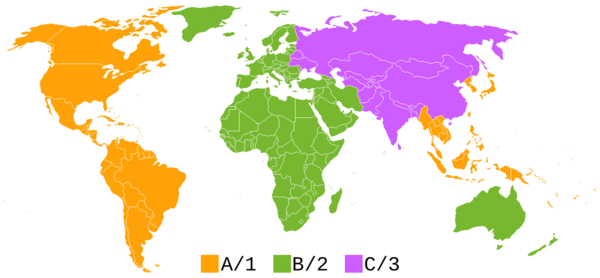Wednesday, March 19, 2008
Shouting in Japanese at restaurants
What is the reason that waiters and waitresses greet customers by shouting in Japanese at Japanese restaurants in Taipei? This phenomenon transcends food types, whether it's fondue or rice and dish. Taipei has the most diverse restaurants with cuisines from all over the world. But do you hear people shouting in Portuguese at a Brazilian barbeque, in Italian at an Italian pasta shop, in Cantonese at a dim sum restaurant, in English at McDonalds' or T.G.I.Fridays? For whatever reason, this is an unsymmetry.
Thursday, March 13, 2008
Region coding for video or game
I've wanted to complain about this long time ago. DVD, Blu-ray, or console game region coding is wrong.
I'm no economist, but there's one thing I remember from my economics class in college. "If a certain product can be used globally (e.g. medicine), and there are forces that prohibit the import/export of such product, then the following are the results compared to a completely free market.
Protection against piracy they say? How does this artificial barrier increase the difficulty for someone in region 1 to copy a region 1 disk, where the clone is also region 1? In practice, a simple PC nowadays can make region-free copies from a single-region disk! Region coding does not make piracy more difficult.
Some people would say "what's wrong with a company trying to make money? Isn't it their primary purpose?" Even so, companies are still members of this society. There are morals and laws to be followed. Everybody would agree that false advertisement is wrong, therefore laws are made so. Region coding is also wrong. The inability to watch/play something from another region is not a result of some natural economic or technological difficulty (e.g. shipping cost, or a DVD can't be read by a CD-ROM). The difficulty is intentionally created by people. The artificial barrier benefits a small number of corporations, at a greater cost for the consumers. This "rob from the poor, give to the rich". This can't be right. Furthermore, what pisses me off the most is the fact that I hear this kind of argument from consumers themselves! Why are you defending the other side while economists already prove that it's bad for the society?
Video and game region coding
I'm no economist, but there's one thing I remember from my economics class in college. "If a certain product can be used globally (e.g. medicine), and there are forces that prohibit the import/export of such product, then the following are the results compared to a completely free market.
- Consumers are hurt
- Producers gain extra benefit
- If we combine the utility (happiness) of consumers and producers, the total utility is still less than that of a free market"
Protection against piracy they say? How does this artificial barrier increase the difficulty for someone in region 1 to copy a region 1 disk, where the clone is also region 1? In practice, a simple PC nowadays can make region-free copies from a single-region disk! Region coding does not make piracy more difficult.
Some people would say "what's wrong with a company trying to make money? Isn't it their primary purpose?" Even so, companies are still members of this society. There are morals and laws to be followed. Everybody would agree that false advertisement is wrong, therefore laws are made so. Region coding is also wrong. The inability to watch/play something from another region is not a result of some natural economic or technological difficulty (e.g. shipping cost, or a DVD can't be read by a CD-ROM). The difficulty is intentionally created by people. The artificial barrier benefits a small number of corporations, at a greater cost for the consumers. This "rob from the poor, give to the rich". This can't be right. Furthermore, what pisses me off the most is the fact that I hear this kind of argument from consumers themselves! Why are you defending the other side while economists already prove that it's bad for the society?
Video and game region coding
- costs more to the consumers than benefits to the producers (the society as a whole incurs loss)
- does not prevent piracy
- is a scheme cooked up by big corporation no other than profit maximization
See also
Sunday, March 09, 2008
What would you do when you …?
Do you often hear expressions such as
- "What would you do when you go to college?"
- "What would you do when you work?"
- "What would you do when you have a boy/girlfriend?"
- "What would you do when you serve in the military?"
- "What would you do when you are married?"
Subscribe to:
Posts (Atom)

